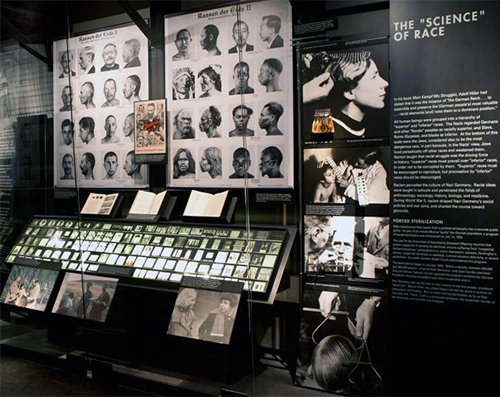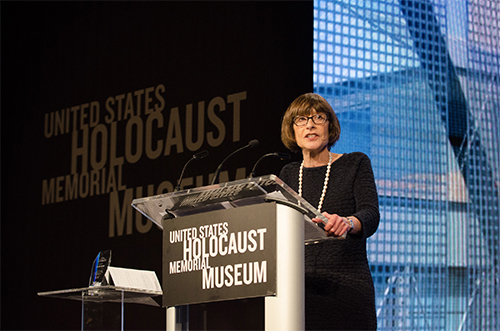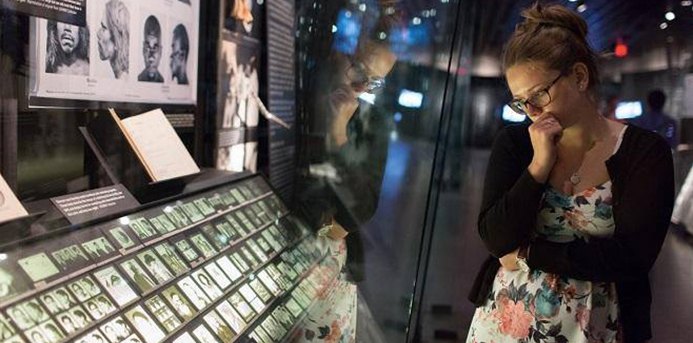In liberation’s aftermath, when the truth of the Holocaust was thrust upon the world’s conscience, “Never Again” became a mantra. Yet, today, we are witnessing a rise in Holocaust denial and antisemitism here at home, as evidenced by recent events in Charlottesville — as well as in the very lands where the Holocaust took place.
Since 1945, genocide has erupted time and again: Rwanda, Yugoslavia, Burma, and elsewhere. So while the Holocaust of World War II is receding in time and the survivors are diminishing in number, the lessons of this history are becoming increasingly urgent.

The United States Holocaust Memorial Museum was dedicated in 1993 as a living memorial, rooted in the conviction that the Holocaust, while a unique historical event, holds lessons for all people — lessons about the human capacity for evil, our propensity to remain indifferent in the face of persecution, and the dangers of unchecked hate and antisemitism. By educating people about the past, the Museum’s founders, many of whom were Holocaust survivors, hoped to change the present. The Museum’s Founding Chairman and Holocaust survivor Elie Wiesel said, “A memorial unresponsive to the future would violate the memory of the past.”
A National Memorial, A Local Impact
Five regional U.S. offices engage their local communities to support the Museum’s mission. The Midwest regional office in Highland Park, Illinois, is still directed by Jill Weinberg. Established before the Museum’s opening in April 1993, Midwesterners still champion its work.
In addition to financial resources, supporters generously donate time, artifacts and research to further the Museum’s impact. With their help, the Museum has built the Holocaust Collection of Record, which, when survivors are no longer here, will be the most authentic teacher of this history.
Donor support allows the Museum to bring educational programming to the area and train teachers to ensure quality Holocaust education is being delivered to area students that inspires them to act today. Dr. Jeff Ellison‘s 8th-grade Bernard Zell Anshe Emet Day School class in Chicago is participating in the Museum’s crowdsourcing project, “History Unfolded.” Said in a Medill News Service interview, “Ultimately, my goal for the project is that students stand up and make a difference. That they — that they look back in the past and see what happened when people did not take a stand.”
A Day of Tribute
A key component of this support has been the Midwest office’s annual Risa K. Lambert “What You Do Matters” Chicago luncheon. Held annually since 1996, the event has grown into the Museum’s largest national fundraising event. Each year the luncheon attracts more than 2,000 attendees, including several hundred Holocaust survivors. Outstanding individuals, foundations or corporations are recognized for their mission-furthering leadership. The event raises more than $5 million annually to support the Museum’s essential work.

This year’s luncheon on Sept. 8 at the Sheraton Grand Chicago honors Mesirow Financial Chairman and CEO Richard Price for his decades-long efforts to raise Holocaust awareness and to fight antisemitism and hate. Price, whose son’s maternal grandparents are Holocaust survivors, was twice appointed by President Barak Obama to the U.S. Holocaust Memorial Council, the Museum’s governing board. “The rise in antisemitism, the hatred we are seeing repeat itself in the world today is deeply disturbing,” Price says. “Everyone has the responsibility to be aware and engaged.”
Keynoting this year’s event is Maziar Bahari, an Iranian-Canadian journalist and filmmaker, and the subject of the film “Rosewater” by Jon Stewart. Bahari was a reporter for Newsweek from 1998 to 2011. In 2009, after reporting on the Iran presidential election crisis, Bahari was jailed for 118 days in solitary confinement in Tehran’s Evin Prison. He was released after a successful international campaign to secure his freedom and wrote a book about his incarceration, “Then They Came for Me.” Bahari’s produced documentaries and news reports for broadcasters around the world, including “The Voyage of the Saint Louis” in 1994. Today, he is the publisher of iranwire.com and directs “Journalism Is Not A Crime and Education Is Not A Crime” campaigns. Bahari and IranWire recently partnered with the Museum to create more films about the Holocaust in Persian and English to provide educational resources for audiences who may have limited access to unbiased information on the Holocaust.
Governor Bruce Rauner and Mayor Rahm Emanuel are honorary chairs for the 2017 luncheon. Rabbi Steven Stark Lowenstein of Am Shalom synagogue in Glencoe and his wife, Julie, are the 2017 event chairs. Her parents escaped Germany in 1938, and they both say they feel, “it is the responsibility of our generation, of all generations, to commit to Holocaust remembrance and education.”
Midwest regional director Weinberg says, “We are deeply concerned about the resurgence of antisemitism and the continuing threat of genocide. At the same time, we are heartened by the determination of Chicagoans, especially young Chicagoans, who refuse to remain silent when they see hatred growing and populations targeted for persecution and destruction.”

